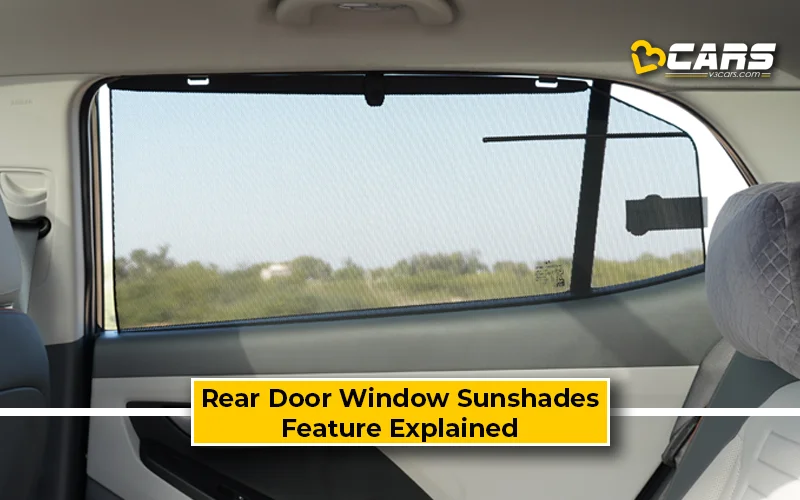Rear Door Window Sunshades – Feature Explained
Driving in sunny conditions, especially during India’s hot summers, can be uncomfortable. The sun’s glare and heat can make the cabin hot and affect visibility. Rear window sunshades are a popular accessory designed to tackle these issues, offering a simple way to make your car’s interior more comfortable and private.

What Are Rear Window Sunshades?
Rear window sunshades are panels or screens designed to block sunlight from entering the rear windows of a car. They come in various forms, from simple mesh screens to more integrated roll-up blinds, and are primarily used to reduce heat, cut down glare, and offer a degree of privacy for rear passengers.
How Do Rear Window Sunshades Work?
Rear window sunshades work by either blocking or reflecting sunlight, preventing it from heating up the car’s interior and causing glare.
- Blocking Sunlight: The material of the sunshade (often mesh or opaque fabric) physically blocks direct sunlight.
- Heat Reduction: By blocking sunlight, they prevent the greenhouse effect inside the car, helping to keep the cabin cooler.
- Glare Control: They diffuse or block harsh sunlight, making it more comfortable for passengers, especially children, to ride in the back.
- Privacy: They reduce visibility into the car from the outside, offering enhanced privacy for occupants.
Types Of Rear Window Sunshades
- Suction Cup/Static Cling Shades: These are common, affordable options that attach directly to the window glass.
- Magnetic Shades: These have magnets built into their frames that stick to the car’s metal window frames.
- Roll-up/Retractable Shades: Some cars (usually higher-end models) come with integrated roller blinds that can be pulled up or down as needed.
What Are The Pros And Cons Of Rear Window Sunshades?
Here are the pros, or advantages, of rear window sunshades:
- Heat Reduction: Significantly lowers the temperature inside the car, reducing the load on the air conditioning and improving comfort.
- Glare Protection: Protects rear passengers from harsh sunlight, making long journeys more pleasant.
- Privacy: Offers a sense of privacy for occupants, particularly in congested city areas.
- UV Protection: Many sunshades offer some level of UV protection, safeguarding passengers and interior materials from harmful rays.
- Affordable (Aftermarket): Many aftermarket options are very inexpensive.
Here are the cons, or disadvantages, of rear window sunshades:
- Reduced Visibility: This is the biggest drawback. Sunshades, especially opaque ones, can severely restrict the driver’s rearward visibility, creating blind spots and increasing the risk of accidents, particularly when reversing or changing lanes.
- Aesthetics: Some aftermarket shades might not look very good or fit perfectly, affecting the car’s appearance.
- Installation/Removal Effort: Non-integrated shades require manual installation and removal, which can be inconvenient.
Legality Of Rear Window Sunshades In India
This is a crucial point for car owners in India. While sunshades are popular for comfort, their legality is a complex and often misunderstood issue.
The Supreme Court of India, in 2012, banned the use of any kind of tinted films or materials (including curtains and mesh screens) on car windows that reduce visibility. The ruling was primarily aimed at enhancing safety and security, making it easier for law enforcement to see inside vehicles.
- The Ruling: The court specifically stated that the “visual light transmission” (VLT) for the front and rear windshields must be at least 70%, and for the side windows, it must be at least 50%. Any material that reduces this visibility is prohibited.
- Sunshades vs. Tint: While sunshades are not “tint” films, many traffic police departments interpret the ruling broadly to include anything that obstructs visibility.
- Enforcement Varies: Enforcement can differ from city to city and state to state. While some areas might be lenient, others are very strict. For instance, car owners in cities like Chandigarh and states like Kerala have been known to be fined for using aftermarket sunshades, as they are seen as obstructing visibility, especially when police need to identify occupants or during security checks.
Recommendation: While factory-fitted, integrated retractable sunshades (which are designed to meet VLT norms when retracted) might be acceptable, we recommend not using them while driving, especially in cities where traffic rules are strictly enforced like Chandigarh, Delhi, Thiruvananthapuram and Pune. Additionally, most aftermarket mesh or magnetic sunshades risk violating the Supreme Court’s order and could lead to fines. It is advisable to check with local traffic police regulations in your specific area.
Can Rear Window Sunshades Be Installed From The Aftermarket?
Yes, rear window sunshades are a very popular aftermarket accessory in India. You can find them in various forms:
- Mesh/Fabric Shades: Held by suction cups or magnets.
- Custom-Fit Magnetic Shades: Designed specifically for different car models.
- Retractable Roller Blinds: Manual roll-up blinds that can be screwed into the door frame or attached with adhesives.
Installation is generally simple for most types, requiring no special tools for suction cup or magnetic versions.
Affordable Cars In India That Offer Rear Window Sunshades?
Most cars in India do not come with factory-fitted rear window sunshades as a standard feature, especially in affordable segments. When they are offered, they are typically integrated, retractable blinds found in higher variants of C-segment vehicles.
- Integrated Retractable Sunshades: These are usually seen in C-segment sedans and SUVs, like higher variants of the Hyundai Verna, Honda City, Kia Seltos, Hyundai Creta, and often in luxury cars. These are factory-fitted and generally comply with regulations when retracted.
For most mass-market affordable cars, any rear window sunshades you see are typically aftermarket accessories purchased and installed by the owner. If you use an aftermarket rear sunshade, be aware of the legal implications of using them in your city.
Also Read: Hill Start Assist Or Hill Hold Control - Feature Explained
Helpful Tools:
- Fuel Cost Calculator for Cars – Know your monthly fuel expense based on usage and mileage
- Car On-Road Price Calculator – Convert ex-showroom to on-road price for any city
Sell Used Car Online – Enter your car and contact details to get an instant price estimate and book a free inspection with our partner network


0 Comments